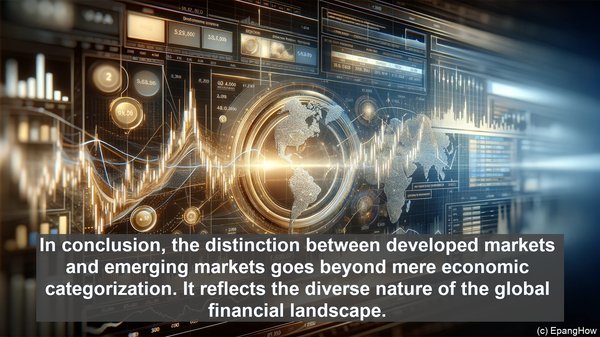Introduction: The Global Financial Landscape
Hello everyone! In today’s video, we’re going to dive into the fascinating realm of finance and explore the distinction between developed markets and emerging markets. As the global economy evolves, understanding these market classifications becomes increasingly crucial for investors, policymakers, and anyone interested in the dynamics of international trade and investment.

Defining Developed Markets
Developed markets, as the name suggests, refer to economies that have reached a high level of economic development and sophistication. These countries are typically characterized by stable political systems, well-established infrastructure, advanced technology, and a high standard of living. Examples of developed markets include the United States, Germany, Japan, and the United Kingdom. These nations boast mature financial systems, deep capital markets, and a wide range of investment opportunities.
Exploring Emerging Markets
On the other hand, emerging markets are economies that are in the process of rapid growth and industrialization. These countries often exhibit a higher degree of political and economic volatility compared to their developed counterparts. However, they also offer immense potential for investors. Emerging markets can be found across various regions, including Asia, Latin America, and Africa. China, India, Brazil, and South Africa are some prominent examples. These nations are characterized by a young and growing population, expanding consumer markets, and a rising middle class.

Factors Influencing Market Classification
The classification of a market as developed or emerging is not static and can change over time. Several factors influence this categorization. Economic indicators such as GDP per capita, inflation rates, and the level of industrialization play a significant role. Additionally, political stability, the strength of institutions, and the ease of doing business are crucial considerations. For instance, a country with a well-functioning legal system, transparent governance, and investor-friendly policies is more likely to be classified as a developed market.
Investment Potential and Risks
Both developed and emerging markets offer unique investment opportunities. Developed markets, with their established infrastructure and mature industries, often attract investors seeking stability and consistent returns. These markets are known for their blue-chip companies, which are typically large, well-established, and financially sound. On the other hand, emerging markets can offer higher growth potential. As these economies develop, new industries emerge, creating opportunities for early-stage investors. However, investing in emerging markets also carries higher risks, including currency fluctuations, political instability, and regulatory uncertainties.
